#AAP Primadomus
Text
El Ministerio de Cultura elimina las subvenciones a los circos con animales salvajes
El Ministerio de Cultura elimina las subvenciones a los circos con animales salvajes
El Ministerio de Cultura dio en 2019 un plazo de tres años para que los circos dejaran de emplear animales salvajes en sus espectáculos. En caso contrario, anunció que no podrían acceder a las subvenciones. Asimismo, anunciaron que en la convocatoria de ayudas se valoraría especialmente la presentación de un plan de abandono en el uso de este tipo de animales. Así lo hizo público el Ministerio a…
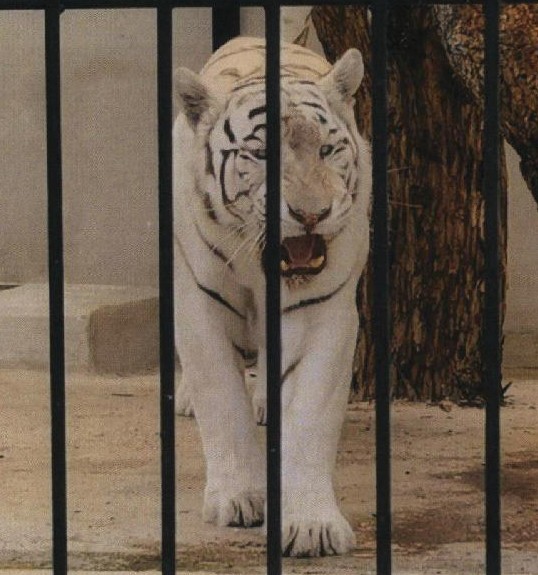
View On WordPress
0 notes
Text
España da refugio al joven león que sobrevivió a los bombardeos de la guerra en Ucrania
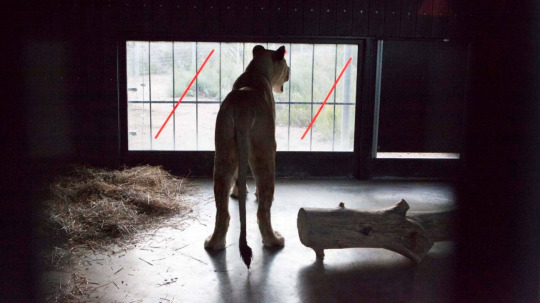
El león Ruru pasó tres años solo y sin ningún tipo de limpieza o cuidado. / AAP
31 julio 2022
Ruru malvivía en un establo a las afueras de Kiev cuando el fuego de mortero sorprendió a su propietario, quien no dudó en abandonar al felino y a otras especies exóticas que tenía en su posesión. El #Cienciaalobestia de esta semana relata el esfuerzo de activistas ucranianos y españoles para que este animal dejase atrás la guerra y encontrase un nuevo hogar en Alicante.
Edgar Hans Cano 31/7/2022 08:00 CEST
La fundación alicantina AAP Primadomus ha rescatado a un león de tres años, Ruru, que vivía en unas condiciones nefastas a las afueras de Kiev (Ucrania). Cuando la zona fue bombardeada, su antiguo propietario huyó y dejó al gran felino a merced de la guerra. Si bien logró sobrevivir, su vida era bastante triste, según sus cuidadores actuales.
0 notes
Photo
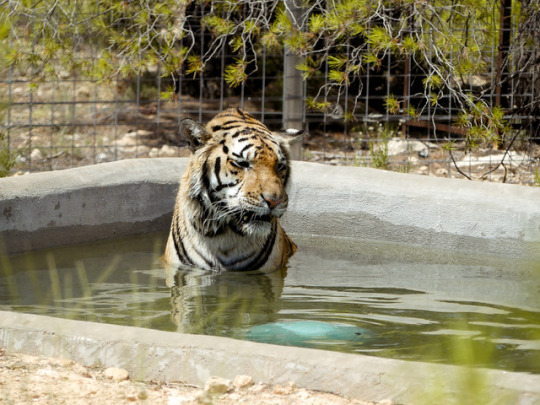
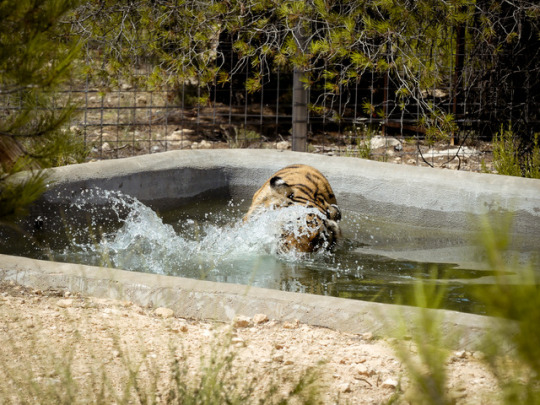
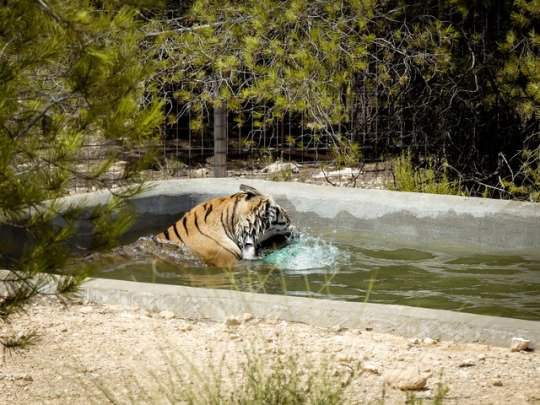
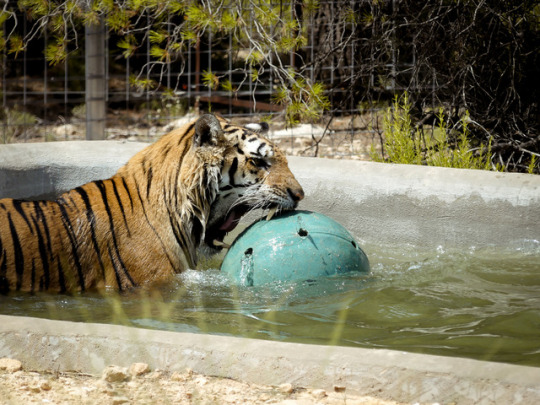
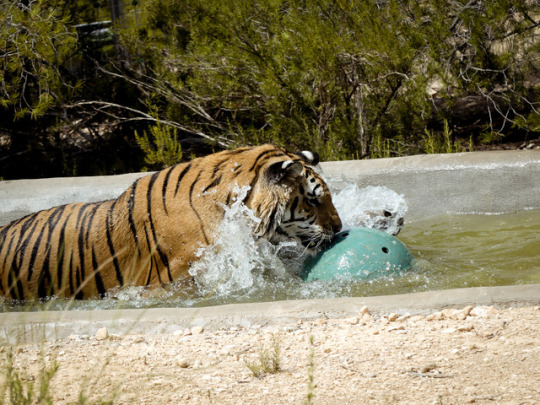
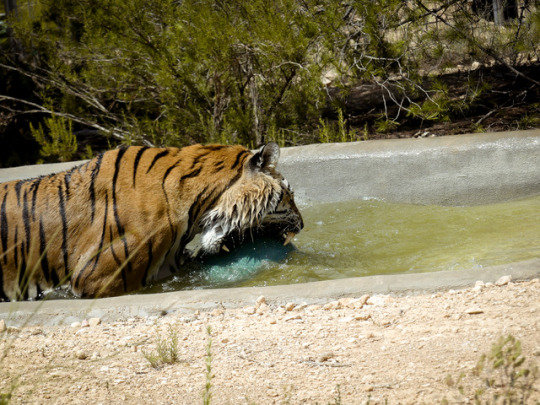
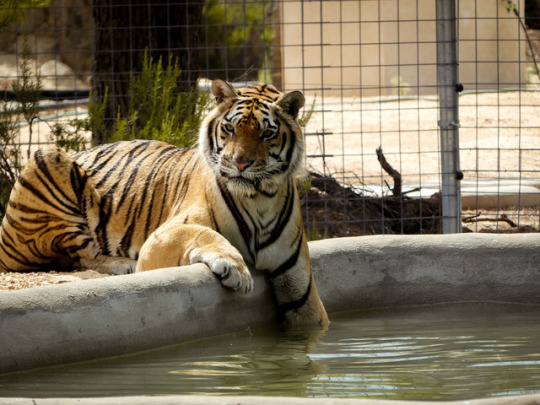
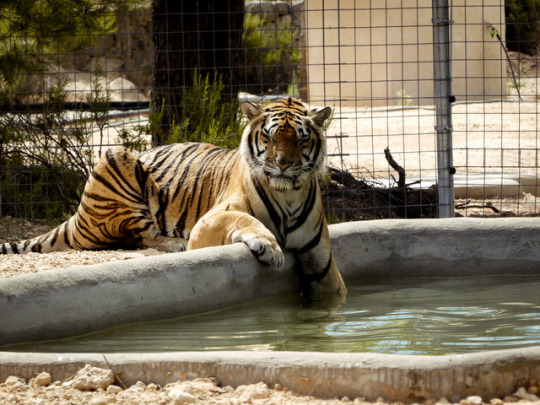
Enrichment is extremely important for wild animals. Here’s Suzu enjoying some time with some of his favourite enrichment: The pool, and his jiggly ball.
(Click the pictures for full size)
222 notes
·
View notes
Video
Happy birthday Moro!!! 😊 (in AAP Primadomus)
17 notes
·
View notes
Photo
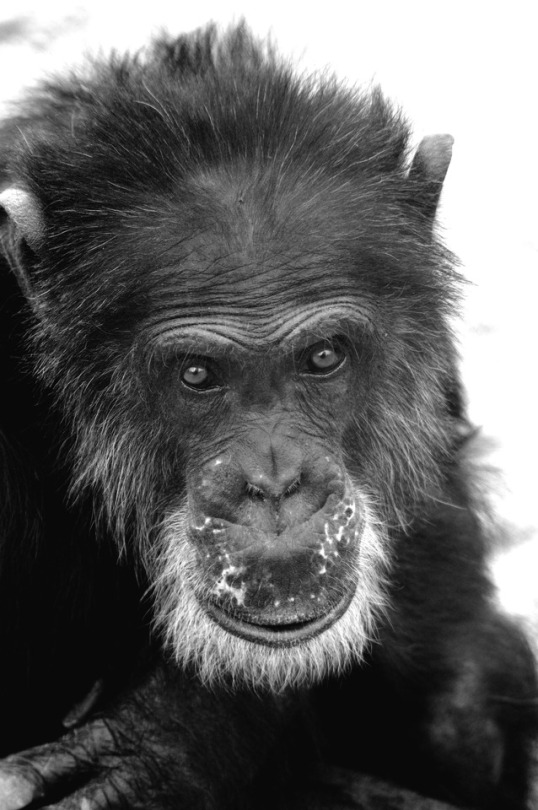
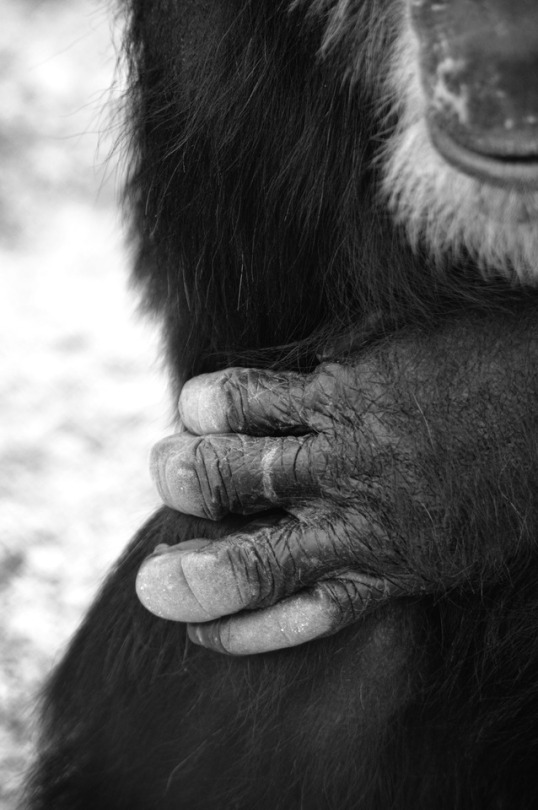
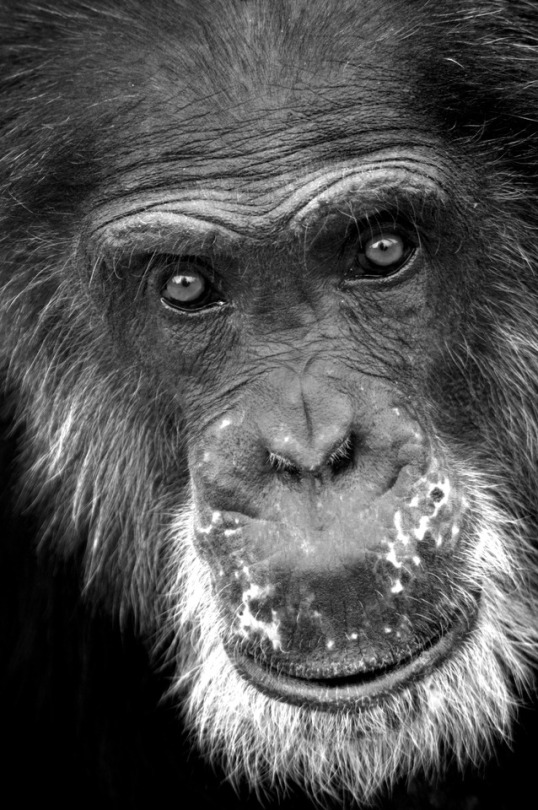
My favourite old man, Antoine.
14 notes
·
View notes
Text
Volunteering for Chimpanzees
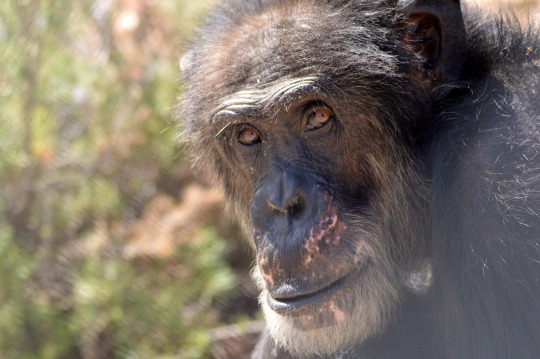
If you love chimpanzees and enjoy hard work, why not consider volunteering at a rescue centre?
In North America, Europe, and the chimpanzee’s native Africa, there are many opportunities to get stuck in and make a positive impact on organisations fighting for a better future for chimpanzees and other primates.
From December to April, I was working as a volunteer primate caregiver at AAP Primadomus, located in sunny Spain. The centre rehabilitates many primates and big cats, with the long-term goals of seeing them move on to suitable permanent homes, and to see a reduction in the wildlife pet and smuggling trades. Primadomus was at that time home to nine amazing chimpanzees, all living within the centre’s long-term primate care section, two buildings known as ‘Modules A and B’. The section also included three groups of macaques that had been successfully re-socialised, and eighteen marmosets waiting for their final journey to new homes. Volunteers, working alongside the experienced and knowledgeable care-giving staff play a vital role in maintaining a high quality of care for the rescued primates.
A Day in the Life
Volunteers arrive at 8:30 am, and gather together the first feed of the day, along with enrichment items that will be placed inside the enclosures. When we arrive at the buildings, we get started on morning tasks- including changing waters, chopping breakfast fruit and checking temperatures. Trusted volunteers are tasked with preparing medications for the primates; with several elderly animals and animals with chronic illnesses, it can be a big job. Volunteers are trained to get to know all the primates as individuals, and will always let the caregiver in charge know of any unusual behaviours or signs of ill health observed.
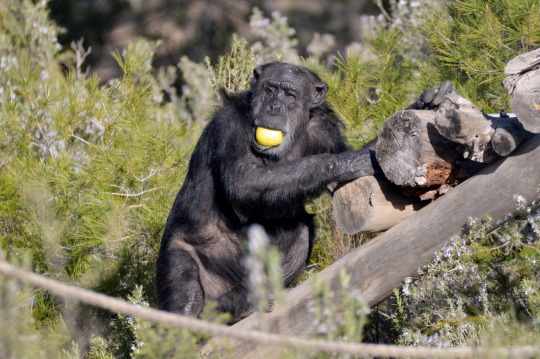
Valued items such as fruit are hidden, and chimpanzee Prudence has just found some!
For some of the primates, breakfast is thrown over the fence into their outdoor enclosure, but for most, it is spread and hidden throughout the enclosure. At this time, the security of the fencing is carefully checked, as well as the general state of the enclosure. Once the enclosures are fully secure and filled with the morning’s goodies, the primates are let out, and for us, cleaning can begin!
For much of the morning, the main task is to thoroughly clean the primates’ indoor living quarters. Chimpanzees especially are VERY messy! Although it’s a smelly job, it is extremely satisfying to create a pleasant environment for the animals. It is an opportunity to look at the primates’ faeces to look for abnormalities- or even take samples for parasite testing, and to take note of what food has been leftover from the day before. Cleaning time is broken up by giving extra enrichment to the primates, helping to keep them occupied.
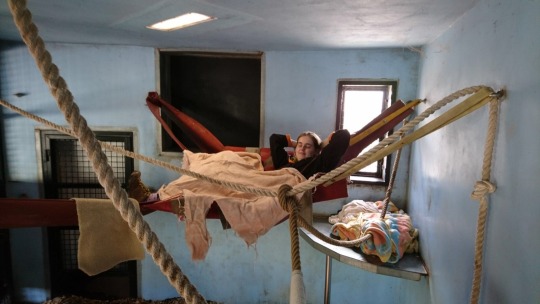
It wasn’t all hard work... testing out a newly installed chimpanzee hammock was rather fun, and relaxing after the heavy lifting taken to get it there.
Cleaning is finished just in time for lunch, which is served by throwing over the fences. With some groups of animals- like Patrick’s chimp group- it is a two-person job to make sure all individuals can get a fair share. Knowing about the relationships between the animals plays a big part here; we always start feeding only once the most dominant animal is ready.
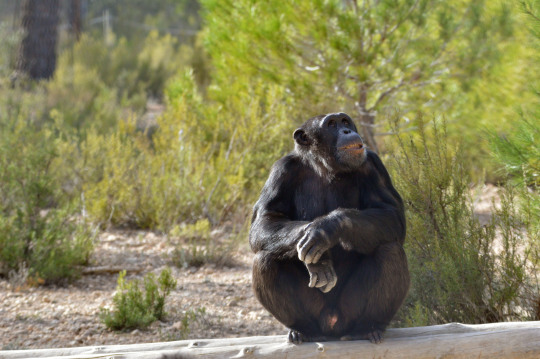
Being the highest-ranked individual in his group, Patrick is front of the queue at lunchtime!
With everyone fed- including us- it’s time to prepare enrichment for the following day. We work from an enrichment calendar, which ensures that all groups receive an interesting variety of stimulating items and activities throughout the month. This could be in the form of food puzzles and toys, sensory enrichment such as scents and spices, or scatter forages. It can be a big job, as there must be enough items prepared for each individual in their group plus two extra to avoid squabbles. While some volunteers are putting together the next day’s enrichment, others wash the items used on the preceding day.
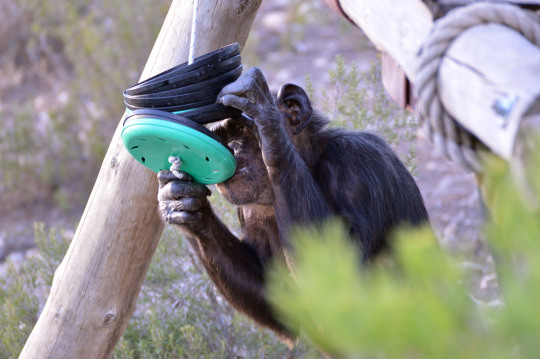
Peggy works on a favourite enrichment item, a Frisbee tower. With sticky food between the layers, the chimpanzees love working on these.
At 4pm, it’s dinnertime. It’s one of the most exciting times of the day, when the chimpanzees are at their loudest. For some of the animals, including in the wintertime, the chimpanzees, it’s time to retire indoors for the night. Nests are made with blankets, woodwool, firehose and deep litter, with each chimpanzee having their favourite spot to bed down. Old Antoine is particularly meticulous in his nest building! It’s wonderfully peaceful to watch the chimpanzees bed down, but we can’t observe for too long- outdoor enclosures still need cleaning.
At the end of the day, we clean the outdoor enclosures, bringing in all the enrichment devices that have been used and removing all the mess. We wrap up the evening by cleaning all the food buckets, checking temperatures and filling out the daily reports. We leave Primadomus tired but satisfied, knowing we’ve given the rescued primates another great day.
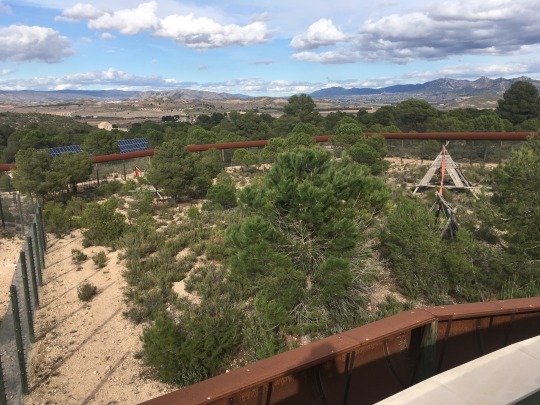
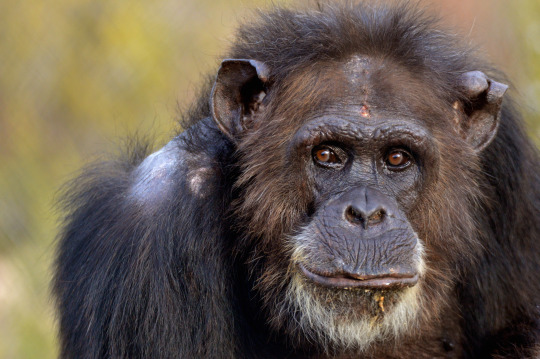
Achille, the oldest chimpanzee at Primadomus, thought to be in his fifties.
Want to give it a try?
AAP Primadomus is always keen to take on volunteers who are dedicated to animal care. If you have three months or more of your time, you can apply to work alongside the experienced and friendly team of caregivers and contribute to Primadomus’ important rehabilitation work. Volunteers are provided accommodation and transport free of charge, and form a closely knit team, all working together for the benefit of the amazing animals in their care. You will experience the highs and lows of caring for wild animals, and learn from knowledgeable and passionate mentors. If you are curious about working with chimpanzees or other primates, there really is no better way to start.
Visit aap.nl/es to learn more about the program.
There are many brilliant opportunities for caring and dedicated individuals to become involved with the fight to create a better future for chimpanzees. Working for these amazing and tragically threatened apes is an utmost privilege and an experience that will stay with you always. Volunteers join a global community that will together make a difference. You too can be a piece of the puzzle.
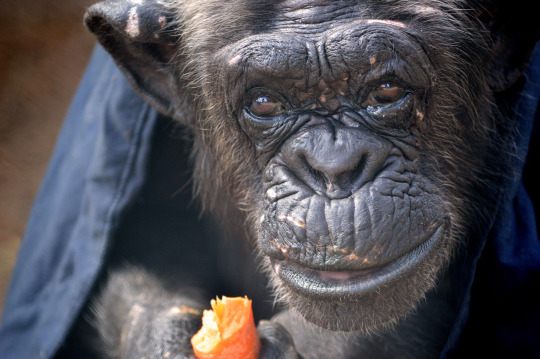
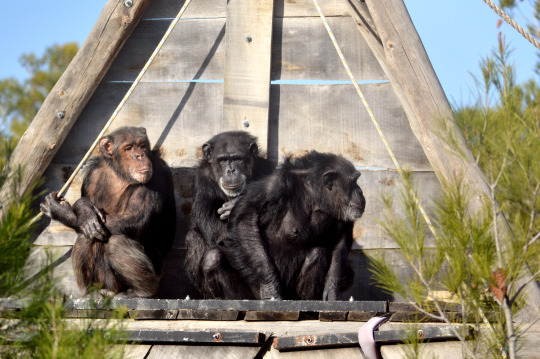
17 notes
·
View notes
Text
In Polen gestrande tijgers op weg naar beter bestaan in Spanje
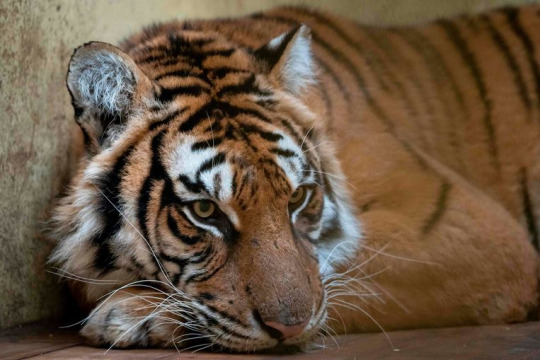
18/10/2019 (natuur & wetenschap) bron: HLN
Vijf van de negen tijgers die ternauwernood een helletocht door Europa overleefden, zijn gisteren op weg gegaan naar een nieuw onderkomen in een dierenopvang in Spanje. De dieren hebben de afgelopen weken in Poolse dierentuinen kunnen aansterken en worden overgebracht naar Primadomus in Villena, de Spaanse vestiging van de Nederlandse Stichting AAP, waar exotische dieren worden opgevangen.
Een woordvoerder van een dierentuin in Poznan, waar een aantal tijgers verbleef, stelt dat de tocht tussen de 24 en 30 uur vergt. De dieren zijn verdoofd en worden vervoerd in een verwarmde vrachtwagen met voldoende ruimte om te bewegen.
Tijdens het inladen van de tijgers bleken twee dieren niet te slapen, ondanks hun verdoving. “Toen het team het hok inging om de dieren eruit te halen, tilde een van de tijgers zijn hoofd op. Dat waren spannende momenten. Maar alles is veilig verlopen”, aldus de woordvoerder.
Directeur David van Gennep van Stichting AAP en een Nederlandse dierenarts gaan mee om het transport te begeleiden.
De dieren waren eind oktober onder erbarmelijke omstandigheden onderweg van Italië naar de Russische republiek Dagestan, waar ze waarschijnlijk in een circus zouden belanden. Bij de Pools-Wit-Russische grens werd het transport staande gehouden omdat de benodigde papieren ontbraken. De tijgers bleken uitgehongerd en uitgedroogd. De afgelopen weken hebben Poolse dierenartsen zich over de dieren ontfermd en ze weer op de been geholpen.
Mijn mening:
Ik vind het zeer erg dat deze dieren voor het circus bestemd waren en in zo’n erbarmelijke toestanden vervoerd werden naar Rusland. Om gebruikt te worden als een act. Gelukkig werden ze gered en hebben ze onderdak gekregen in een Poolse zoo. Slechts vijf van de negen dieren zijn onderweg naar Spanje waar ze zullen worden opgevangen in een vestiging waar exotische dieren worden geholpen en terug op krachten gebracht. De tijgers hadden geluk dat de mensen die hen vervoerden papieren misten want daardoor konden Poolse dierenartsen zich over de dieren ontfermen en ze veilig weghalen. De dieren leden aan uithongerings verschijnselen en waren ook uitgedroogd.
Link naar artikel:
https://www.hln.be/wetenschap-planeet/dieren/in-polen-gestrande-tijgers-op-weg-naar-beter-bestaan-in-spanje~a1dec737/
0 notes
Text
El circo Wonderland pone fin a los espectáculos con animales salvajes
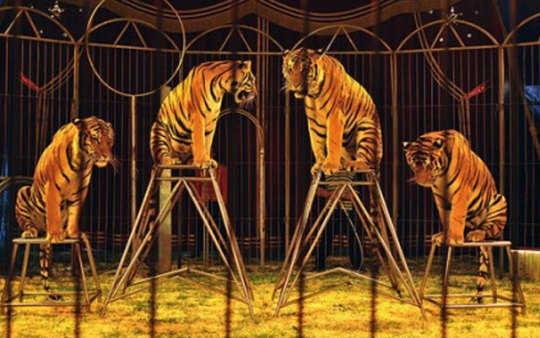
El circo Wonderland, situado en Villena, Alicante, se convierte en el segundo circo que en los últimos meses decide voluntariamente poner fin a la utilización de animales salvajes.
La empresa ha donado sus grandes felinos a un complejo de recuperación que gestiona la Fundación Internacional AAP Primadomus; el mayor centro de rescate de animales exóticos del sur de Europa, que se sitúa en Villena, Alicante. A partir de ahora este se hará cargo del cuidado y manutención de siete tigres y un león; y se ha comprometido por escrito a no volver a usar animales salvajes en sus espectáculos.
La operación de rescate de los felinos ha contado con la colaboración absoluta del circo. Se procedió a la sedación, carga, transporte y finalmente suelta de los animales en las modernas instalaciones de cuarentena de Primadomus, donde pasarán las próximas 4 semanas hasta que se certifique que no portan ninguna enfermedad contagiosa. Luego serán ingresados a sus amplias instalaciones definitivas para continuar su proceso de rehabilitación. Los animales llegados a AAP Primadomus, han sido recuperados en operaciones dirigidas contra el tráfico ilegal, la tenencia ilícita privada, circos, publicidad, fotografía ambulante o por estar en zoológicos sin las condiciones adecuadas.
En los últimos tres años, gracias a la labor de la coalición InfoCircos de la que AAP Primadomus es miembro, en España se están dando pasos acelerados hacia el fin de los espectáculos circenses con animales salvajes. Cataluña, Islas Baleares, Galicia, Comunitat Valenciana, Región de Murcia y Aragón ya los han prohibido o comenzado los trámites legislativos para ello, mientras que en otras comunidades como Castilla la Mancha o Extremadura hay voluntad política para hacer lo propio. Además, más de 440 municipios de todo el Estado se han declarado "libres de circos sin animales", entre ellos importantes ciudades como Madrid, Málaga, Valencia o Pamplona, y más de 130.000 personas han firmado una petición para que se eliminen las subvenciones públicas a estos espectáculos.
Las sucesivas prohibiciones en un número creciente de países, tanto en Europa como alrededor del mundo, son reflejo del progresivo rechazo social a este tipo de “entretenimiento” que conlleva el sufrimiento de animales.
¡Rechaza circos con animales, zoológicos y acuarios!
Infórmate sobre derechos animales y veganismo con nosotros cada semana: Suscríbete en AnimalLibre.org/Contacto
Fuente: http://m.20minutos.es/noticia/3141812/0/circo-wonderland-pone-fin-su-espectaculo-con-animales-salvajes-dona-centro-rescate/
5 notes
·
View notes
Text
La Guardia Civil recupera un serval africano en una parcela de Polop
La Guardia Civil recupera un serval africano en una parcela de Polop
La Guardia Civil de Alicante, a través de los agentes del Servicio de Protección de la Naturaleza (SEPRONA) y por medio de un aviso de
un ciudadano, el pasado 28 de enero recuperó un serval africano que había accedido a una parcela de la localidad de Polop. Finalmente, el animal ha sido entregado a la fundación AAP Primadomus de Villena con la finalidad de darle un entorno más idóneo a sus…
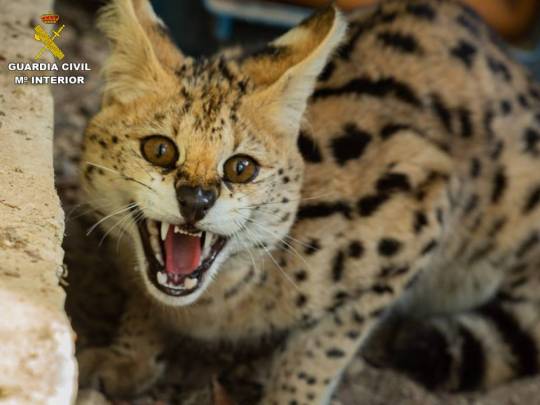
View On WordPress
0 notes
Text
Dos leones víctimas del circo y la guerra se reencuentran en Sudáfrica
La leona Nala fue rescatada de un criador ilegal relacionado con el mundo del circo en Francia. Tras su estancia en el centro de rescate AAP Primadomus en Villena (Alicante), ha sido trasladada esta semana a un santuario en Sudáfrica donde le espera un macho salvado in extremis de un zoo de las proximidades del escenario bélico de Alepo en Siria.
etiquetas: leones, victimas, circo, guerra, reencuentran, sudáfrica
» noticia original (www.agenciasinc.es)
0 notes
Photo
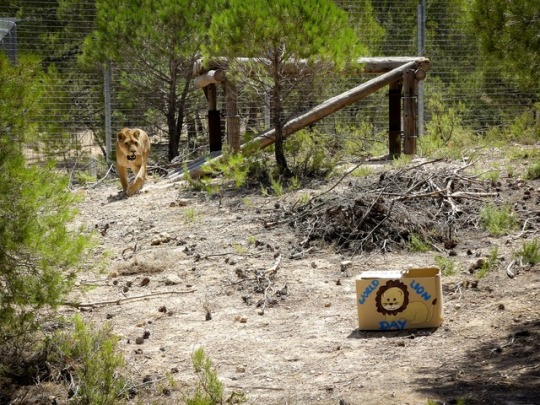
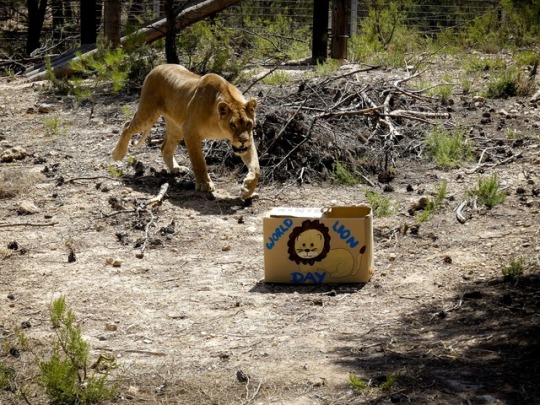
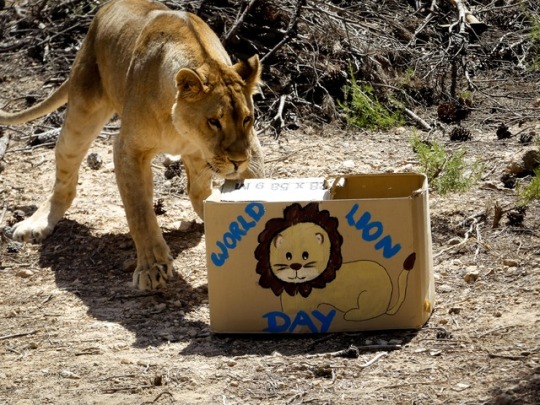
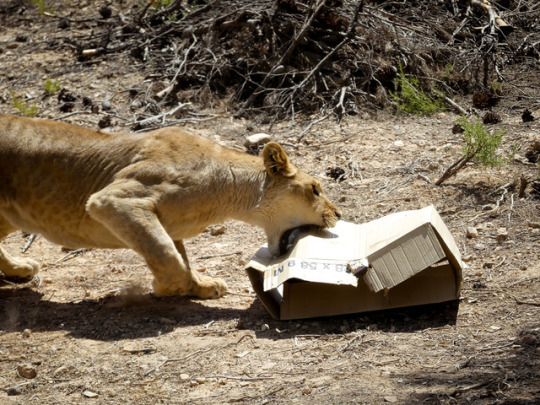
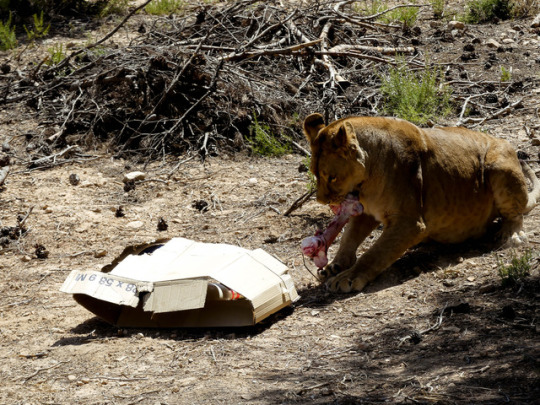
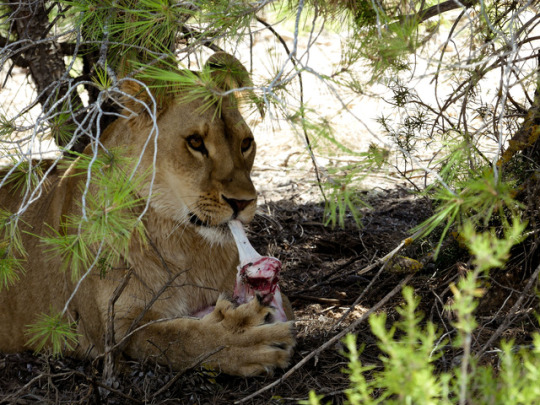
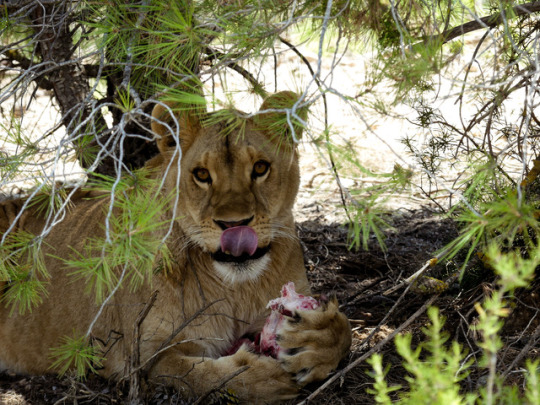
Happy World Lion Day!
Here’s Nala celebrating with some fun and tasty enrichment.
Lions are not as endangered as tigers but they’re still classified as vulnerable by the IUCN. In less than a century we went from over 200.000 wild lions in Africa to about 20.000. They’re already extinct in 26 African countries due to illegal trading, trophy hunting, habitat loss and fragmentation. Thankfully each day there are more lion conservation projects so there’s still some hope to undo a little bit of what humanity has done to this animal.
(Click the pictures for full size)
125 notes
·
View notes
Video
youtube
Today it’s been two years since Aya and Reza arrived to AAP Primadomus, they were the first big cats here, so we made this for them :) (although Savannah stole the show being the most playful one!)
2 notes
·
View notes
Photo

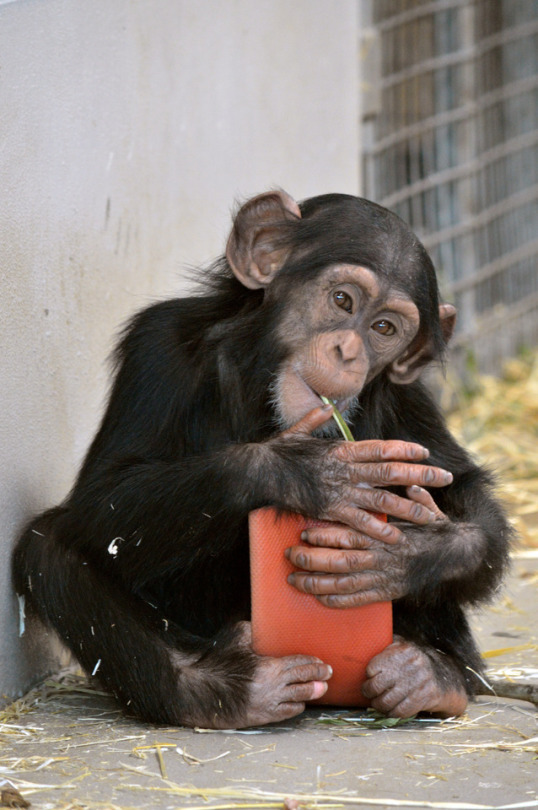
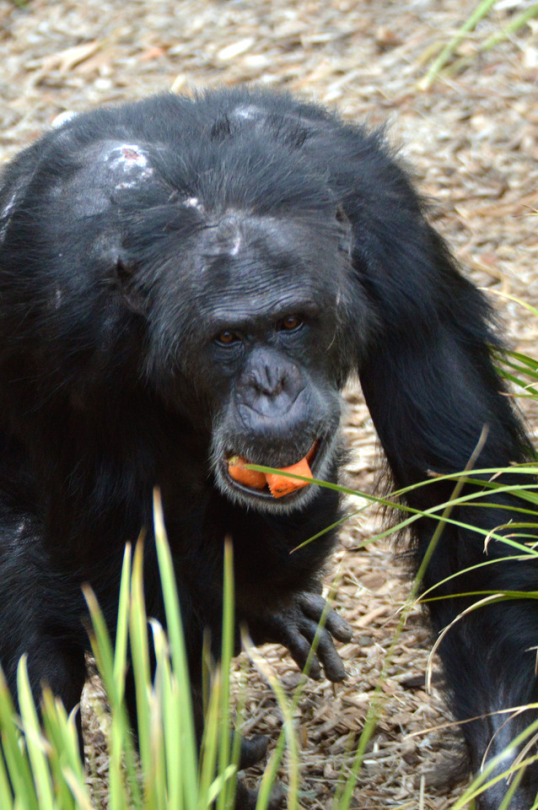
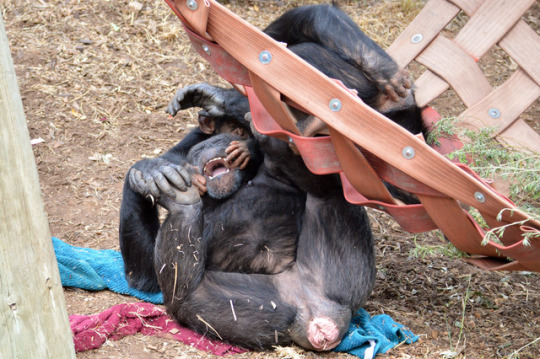
Yikes, better blow some cobwebs off this blog! So, here are a few photos of the Monarto gang, and a brief update on my long slog towards a career working with primates. :) Please feel free to get in contact- I love meeting people with similar goals and interests!
What I’ve been doing...
First big news, I finished my degree! I now have hanging on my wall a Bachelor of Science (Biodiversity and Conservation). During one of the summer breaks, I spent three months as an intern at Chimps Inc., a sanctuary in Oregon. Travelling to America and working with seven amazing chimpanzees was a high very high point in my life so far.
Since then, I’ve been working on my Certificate III in Captive Animals through Open Colleges, which has included three awesome weeks shadowing keepers on all rounds at Monarto Zoo. And yes, I continue to visit and photographs the zoos chimpanzees whenever I can. I’ve had some difficulties with depression and anxiety in the past two years, but I’ve turned some corners and feel like things are getting better.
What I’ll be doing next...
I’ll be doing the practical component of the certificate course at Banana Cabana Primate Sanctuary in Sydney this August, and hopefully complement it with weekly volunteering at Minton Farm Animal Rescue Centre. It would be good to have the course finished by the end of the year.
I have applied to spend six months from November volunteering at AAP Primadomus, the Spanish branch of Stichting AAP which provides long term or permanent care to primates and big cats in need. Should I be fortunate enough to be accepted, I will be working with chimpanzees, macaques, lions, tigers, and various other primate and cat species.
Aside from that, I’m going to keep on applying for jobs, and travelling to do work to boost up my resume.
6 notes
·
View notes
Text
RT @Llobre_Gats: El el próximo programa de radio 'Animales en las ondas' del 16/09 en la sección 'Conexión nacional' podrás escuchar la AAP Primadomus de Alicante hablándonos sobre primates y grandes felinos. NO TE LA PIERDAS!!! Síguenos en Twitter https://t.co/5xCTVkls9W https://t.co/0NsDxWPNv0
0 notes
Text
Chimpanzees as pets and wild animal souls. Life at AAP Primadomus in Spain.
0 notes